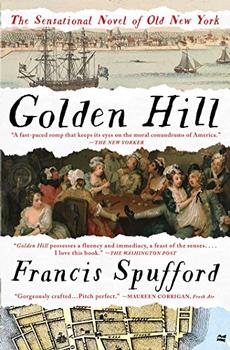Summary | Excerpt | Reading Guide | Reviews | Beyond the book | Read-Alikes | Genres & Themes | Author Bio

A Novel
by Francis SpuffordFrom "one of the most original minds in contemporary literature" (Nick Hornby) the bestselling and award-winning author of Golden Hill delivers a noirish detective novel set in the 1920s that reimagines how American history would be different if, instead of being decimated, indigenous populations had thrived.
Like his earlier novel Golden Hill, Francis Spufford's Cahokia Jazz inhabits a different version of America, now through the lens of a subtly altered 1920s—a fully imagined world full of fog, cigarette smoke, dubious motives, danger, dark deeds. And in the main character of Joe Barrow, we have a hero of truly epic proportions, a troubled soul to fall in love with as you are swept along by a propulsive and brilliantly twisty plot.
On a snowy night at the end of winter, Barrow and his partner find a body on the roof of a skyscraper. Down below, streetcar bells ring, factory whistles blow, Americans drink in speakeasies and dance to the tempo of modern times. But this is Cahokia, the ancient indigenous city beside the Mississippi living on as a teeming industrial metropolis, filled with people of every race and creed. Among them, peace holds. Just about. But that corpse on the roof will spark a week of drama in which this altered world will spill its secrets and be brought, against a soundtrack of jazz clarinets and wailing streetcars, either to destruction or rebirth.
When it comes to alternate history, a compelling scenario only gets you so far. It's impressive to come up with a well-realized setting, one that might have existed had a few metaphorical butterflies not fluttered their wings, but simply describing how this strange new world came to be is not enough: a fascinating history textbook is still a history textbook. What's really impressive is using that setting as a jumping-off point for a cracking great story, the kind of story that turns a bit of bedtime reading into an all-nighter. With Cahokia Jazz, Spufford has done exactly that...continued
Full Review
 (626 words)
(626 words)
(Reviewed by Joe Hoeffner).
 Joe Barrow, the protagonist of Francis Spufford's Cahokia Jazz, does not speak the titular city's common language, Anopa. He learns bits and pieces of it over the course of the novel, at around the same pace as the reader (heeding the suggestion of his friend Alan Jacobs, Spufford does not include a glossary). We learn the words for Native, Black, and white people (takouma, taklousa, and takata); the word for "warrior," which is the preferred title for Cahokia police officers (tastanagi); the word for "chief," in this context referring to the chief of police (miko).
Joe Barrow, the protagonist of Francis Spufford's Cahokia Jazz, does not speak the titular city's common language, Anopa. He learns bits and pieces of it over the course of the novel, at around the same pace as the reader (heeding the suggestion of his friend Alan Jacobs, Spufford does not include a glossary). We learn the words for Native, Black, and white people (takouma, taklousa, and takata); the word for "warrior," which is the preferred title for Cahokia police officers (tastanagi); the word for "chief," in this context referring to the chief of police (miko).
As Spufford explains in the Notes and Acknowledgements at the end of Cahokia Jazz, Anopa became "something like a Swahili for the whole indigenous population at the ...

If you liked Cahokia Jazz, try these:

by Robert Jackson Bennett
Published 2024
A Holmes and Watson–style detective duo take the stage in this fantasy with a mystery twist, from the Edgar-winning, multiple Hugo-nominated Robert Jackson Bennett

by Francis Spufford
Published 2018
Winner of the 2017 Costa First Novel Award.
The spectacular first novel from acclaimed nonfiction author Francis Spufford follows the adventures of a mysterious young man in mid-eighteenth century Manhattan, thirty years before the American Revolution, in "a first-class period entertainment" (The Guardian).
The dirtiest book of all is the expurgated book
Click Here to find out who said this, as well as discovering other famous literary quotes!